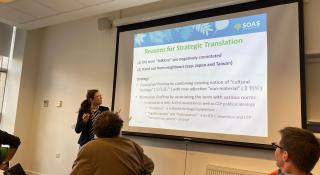
Breadcrumbs navigation
Decolonising to reimagine International Relations: An introduction
Somdeep Sen discusses the key points from his new Review of International Studies (RIS) article. The article is an agenda-setting introduction to the latest issue of RIS, which comprises a forum on decolonising to reimagine International Relations. Do go on to read the full article, and the rest of the issue.
Those of us who have – say at a department seminar, a panel, or a roundtable – made the case for decolonising International Relations are probably familiar with the following question: “…but is decolonisation really possible?”. This question usually comes from a well-meaning member of the audience who seems sufficiently appalled by the colonial roots of the discipline. Yet, the rhetorical question is meant to suggest that decolonisation is not a practical aspiration. As such, they would argue, when colonialism is so ubiquitous to where the International Relations comes from, what it explains and who it represents then, realistically, a decolonised discipline, entirely stripped of its coloniality, is unattainable.
This forum, however, places the task of decolonising International Relations squarely in the realm of possibility and asks, what would a decolonised field look like? Here, it is indebted to the wide range of scholarly works that have established the colonial and racialised makings and workings of the discipline and revealed the manner in which International Relations replicates the asymmetry in global power relations. The impact of this strand of scholarship has been groundbreaking, evidenced not least by the appearance of multiple articles and special issues in major International Relations journals as well as panels and roundtables at large international conferences deliberating the coloniality of the discipline. But the question “is decolonisation really possible?” is also a reminder that recognition does not necessarily lead to the acceptance of reparative strategies. The excuses for inaction range from decolonisation being too all-encompassing a task, too vindictive to the beneficiaries of International Relation’s coloniality or too disruptive to the “way things are/have been”. Of course, by acknowledging the discipline’s colonial makings, these detractors secure their moral standing. At the same time, by claiming that decolonisation is impossible, they secure their own futures as beneficiaries of the norms and practices of a colonial discipline. Left in this manner, calls of decolonisation become metaphorical and without the ‘teeth’ to inflict real disciplinary change.
In contrast, this forum is concerned with materialising real change as it reimagines what International Relations is and does as a discipline that was established to defend colonialism and imperialism. To this end, it imagines decolonisation to be a structure. In general, colonialism should be understood as “not an event” but a structure that seeks to ensure the long-term reproduction of the localised domination of an exogenous entity. In a disciplinary context, the coloniality of International Relations is also a structure that manifests in scholarly and institutional norms and practices that help keep up International Relations as a colonial discipline. Its decolonisation then would also need to be a structure that, as an antidote, would replace the colonial disciplinary architecture with scholarly and institutional norms, traditions and practices that both, mitigate the effects of International Relations’ colonial origins, and reimagine the discipline anew as one that meaningfully engages with and represents the past, present and futures of peoples and perspectives that have thus far been marginalised.
Driven by this agenda, the contributions in this forum then take point of departure from varied sites within the discipline. Ilan Kapoor, for instance, focuses on development studies, a subdiscipline that he describes as “(neo)colonial…par excellence” that carries with it legacies of “imperial plunder…and colonialism’s civilising mission”. Decolonisation then, he argues, needs to be both epistemic and material. Epistemic decolonisation would entail a meaningful engagement with indigenous/subaltern conception and experience of the world that does not just valorise subalternity but also grants agency to indigenous/subaltern knowledge in order to alter “how we work and live”. That said, it is also important to remember that the nature and purpose of disciplinary knowledge is also shaped by the institutional context in which this knowledge is produced. Herein, Kapoor proposes that material decolonisation would need to reform institutions of higher education. This would mean both ensuring that “critical learning and knowledge production” is available and accessible on campus and combatting the commodification of higher education that has resulted in education and research being valued only when it “offers solutions” to problems.
One way of pursuing epistemic decolonisation is to reimagine International Relations’ conceptual vocabulary that forms the “building blocks” of its grand theoretical claims about the world. As a way of then formulating a decolonised disciplinary lexicon, Ajay Parasram focuses on the concept of “sovereignty” that tends to be rooted in a ‘Eurocentric genealogy’ and enjoy almost ‘universal validity’ in disciplinary musings. He notes that persisting with a uni-versal conception of “sovereignty” is ‘akin to ongoing colonialism’ as it effaces other ways of existing in the global order. And, as a reparative approach, Parasram contrasts Mi’kmak conceptions of sovereignty with the settler colonial state’s claim of sovereign authority and proposes that the decolonisation of the discipline is only possible when International Relations adopts a pluriversal concept of sovereignty and, more generally, a pluriversal view of the global order. Of course, it is not mere happenstance that Parasram “travels” to the Mi’kma’ki territory to propose a pluriversal viewpoint. What International Relations says often has a lot to do with the geographical location from where the global order is being theorised. Look outwards from the metropole, expectedly, leads to knowledge production that is in service of the colonial and imperial. Therefore, it becomes necessary to “travel” elsewhere to formulate a scholarly perspective that can unsettle International Relations’ coloniality and white supremacy and fundamentally alter our worldview.
To this end, Kristina Hinds looks to the Caribbean and notes that it is often assumed that the region’s invisibility on the map is synonymous with its ‘insignificance in world affairs’. However, she proposes that the region has played a significant role in ‘building systems of empire’ and underlines the need to meaningfully engage with ‘Caribbean vantage points’. Hinds then looks at the functioning of offshore financing centers (OFCs) in Caribbean states as not just ‘rule-breaking gimmicks’ but a means of exercising agency that is foundationally shaped by global processes, thus revealing the region to be a valuable site for better understanding and theorizing the global order. The Arab world, El Kurd finds, is similarly missing in efforts to decolonise International Relations. Looking at efforts to decolonise the discipline emerging elsewhere, she then assesses the initiatives of the Doha Institute for Graduate Studies (DI) and the Arab Center for Research and Policy Studies (ACRPS) to increase access to the discipline, decolonise pedagogical approaches to teaching International Relations and facilitate theory production in the Arab world.
That said, El Kurd’s critical assessment of such efforts also reveals a certain a ‘messiness’ where substantive decolonisation is undermined by regional scholars’ focus on ‘performative metrics’ and by Northern scholars who posture at localism but continue to exclude regional scholars from the disciplinary mainstream. But while detractors would see this as a reflection of the futility of any effort to decolonise International Relations, this ‘messiness’ is also a reminder that decolonisation rarely follows a linear path. Frantz Fanon’s influential works have demonstrated that the colonial endeavour did not just inflict a permanent state of material impoverishment and destitute in the sector of the colonised. It equally sought to disconnect the colonised from their sense of self, to eventually erase any memory of who we are are/were before ‘colonial deformation’ set in. It is only natural then, the struggle to escape the yoke of colonialism and imperialism tends to chart a long, labored and often circuitous process.
But rather than be discouraged by this long and seemingly immovable shadow of colonial deformation, Consolata Raphael and Lisa Ann Richey view this messiness to be a part and parcel of any attempt at decolonising the discipline. Their contribution then takes point of departure in their effort to decolonise a concept like “humanitarianism” in the context of a North-South research collaboration in Tanzania. Undoubtably, the concept is steeped in ‘white saviorism’ and mirrors the core-periphery hierarchies that are characteristic in the workings of International Relations. But instead of simply abandoning it, Raphael and Richey engage in a critical mode of conceptual decolonisation that incorporates indigenous understandings of helping. The authors then take an inductive and practice-based approach to decolonial theory building through an ‘iterative back-and-forth exchange’ that neither retreats into relativism nor renounces the ‘power for generalisability’. Expectedly this iterative process is messy. In fact, the entrenched coloniality of the concept of humanitarianism makes decolonisation all the messier. But Raphael and Richey conclude that this is only a reflection of the wider messiness that often involves decolonising a discipline.
The contributions to this forum thus underline that decolonisation needs to be a multi-sited and multifaceted disciplinary endeavor. Its implications, however, seem to extend beyond the walls of the academy, as the decolonisation agenda has drawn the ire of public officials and routinely been the target of public policy. But why? In the postscript to this forum, I note that, in many ways, the derisive and irreverent responses to the decolonisation agenda are only expected seeing as it has the potential to disrupt the futures of the beneficiaries of colonial norms, practices, and institutions. Though equally, decolonisation is contentious as it unsettles the assumption that scientific knowledge production is an apolitical affair. It reveals the politics that is embedded in what we know and, in doing so, underlines the fallibility of a singular (scientific) frame, means of measurement or rule of inference for understanding a social reality. In fact, decolonisation understood in this way is about opening up the possibility of acknowledging there isn’t a social reality. In this sense, the postscript concludes, every social phenomenon can be experienced in a multiplicity of ways and therefore reimagining International Relations in view of decolonising it requires a political response that empirically, methodologically, and theoretically forefronts the multiplicity of perspectives and experiences that have thus far been marginalised in the studying and understanding of social realities.
Want to know more? You can read the full article at DOI: https://doi.org/10.1017/S0260210523000177
This particular article is open access, however BISA members receive access to RIS (and to our other journal European Journal of International Security) as a benefit of membership. To gain access, log in to your BISA account and scroll down to the 'Membership benefits' section. If you're not yet a member join today.
Photo by Malu Laker on Unsplash


